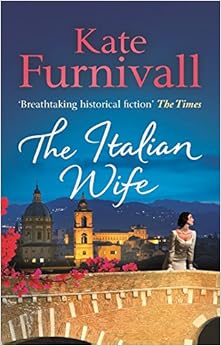Author: Kate Furnivall
Published: 7th May 2015
Publisher: Sphere
Today I am delighted to host my spot on the Blog Tour for Kate Furnivall's The Italian Wife. I have a guespost to share with you talking about Revenge as a theme in the story. Hope you like it! All the other brilliant stops on the tour are listed below, so please do stop by their blogs for some great content.
Guestpost
Revenge as a theme in the Italian Wife
Revenge is a dish best served cold.
That’s what they say, isn’t it? But
in THE ITALIAN WIFE it is a potage served so scalding hot, it would strip the
enamel off your teeth.
Italy is a country where emotions
seem to come in only two temperatures – hot or hotter. They don’t do lukewarm.
And certainly their anger is never ‘cold’ or ‘icy’. It’s one of the reasons I
love Italy so much. They know how to express emotion – love, anger, grief, joy,
despair – with a passion that makes life more intense and desirable.
So when things go seriously wrong
in THE ITALIAN WIFE, you just know that life in Bellina is going to get a whole
lot more interesting. We call it revenge, but the Italians have their own
special word for it – vendetta. A scary word. It has a powerful meaning and a
serious significance that can never fade, never die, until the required last
drop of blood is exacted, even if it takes generations to do so. It is the duty
of a son to avenge a slight to his father, whether it takes a year – or ten
years or even fifty years later. The vendetta must be fulfilled.
The story of THE ITALIAN WIFE takes
place in 1932, a turbulent era in Italy’s history. There are two people who have
cause to seek vengeance for a past wrong. Isabella Berotti is one. She is an ambitious
architect on the new town being constructed and ten years earlier her husband,
Luigi Berotti, was shot dead in broad daylight in a bustling Italian
marketplace when Isabella was pregnant with his child, laughing happily at the
exact moment the trigger was pulled.
It was a time when Mussolini ruled
the country with the full force of Fascism and he employed men such as Luigi
Berotti as part of his militia army of Blackshirts to do his brutal bidding.
Ten years later, what seems like a chance occurrence – a woman asks Isabella to
watch over her child for a moment – changes the course of Isabella’s life and
she sets off on a path to find her husband’s killer. She is eager to help the
abandoned child, Rosa, but at the same time she needs to unlock the information
that she knows is in the child’s head. It is a fine emotional line that
Isabella walks.
The second person who seeks
vengeance for a past wrong is Carlo Olivera, a freedom fighter who rebels
against Mussolini’s police state and the suffering that it brought to his
family. He has complex personal reasons for his vendetta and when his path
crosses with Isabella’s, they are caught in a maze of tangled motives.
But Italians know how to love even
more intensely than they know how to hate. Neither Isabella nor Olivera are
prepared for how love can weave itself around the threads of vengeance,
changing the fabric of the emotion. Olivera risks not only his life, but
everything he believes in, for his daughter, Rosa, while Isabella’s love for
Roberto Falco, the town’s subversive photographer, leads her, step by step, closer
to the truth that she needs to find.
If she is ever to let the vendetta
go – let’s say it bluntly: the requirement is blood for blood – and if she is no
longer going to be afraid to look at herself in the mirror, then she has to
release herself from the promise of revenge that she has made. It is love that
enables her to catch a glimpse of happiness in a future that will be served not
cold, but warm and passionate – the way only Italians know how.










No comments:
Post a Comment